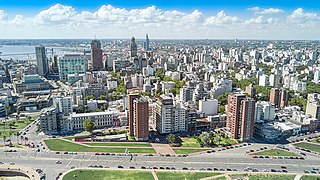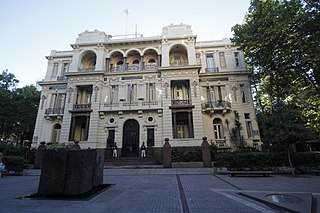
Montevideo is the capital and largest city of Uruguay. According to the 2011 census, the city proper has a population of 1,319,108 in an area of 201 square kilometers (78 sq mi). Montevideo is situated on the southern coast of the country, on the northeastern bank of the Río de la Plata.

The Chamber of Senators of Uruguay, or Senate, is the upper house of the General Assembly of Uruguay. It has 30 members, elected for a five-year term by proportional representation; the Vice-president presides over the chamber's sessions.

The General Assembly of Uruguay or parliament is the legislative branch of the government of Uruguay, and consists of two chambers: the Chamber of Senators and the Chamber of Representatives. General Assembly has 130 voting members: 99 representatives and 30 senators, the Vice President of the Republic, who serves as President of the General Assembly, and the Senate has the right to vote. The legislature meets in the Legislative Palace in Montevideo. Both senators and representatives are chosen through proportional representation for five-year terms.

The Legislative Palace of Uruguay is a monumental building, meeting place of the General Assembly of Uruguay, and the seat of the legislative branch of the Uruguayan government. It is located in the barrio of Aguada in the city of Montevideo.
La Floresta is a city and resort on the Costa de Oro of the Canelones Department in Uruguay.
Progreso is a city in the Canelones Department of southern Uruguay.

Colonia Valdense is a small city located in southwestern Uruguay, within the Colonia Department. It is home to around 3,200 people.
Juan Manuel Ferrari was an Uruguayan sculptor, born on Montevideo on 21 March 1874 and died in Buenos Aires on 31 October 1919.

The Piria Palace is the headquarters of the Supreme Court of Uruguay. Located on the south side of the Plaza de Cagancha in Montevideo, on the Human Rights Passage, it was declared a National Historical Monument in 1975. In front of its main entrance is the Monument to Justice, a work by Rafael Lorente Mourelle.
Verdad ('Truth') was a short-lived daily tabloid newspaper published in Montevideo, Uruguay, published in the early 1950s as an organ of the Communist Party of Uruguay. The publication was launched in late August 1950, in the run-up to the general election held in that year.

José Hugo Burel Guerra, is a Uruguay journalist and author.
Fany Puyesky Mitnik was a lawyer, writer, and dramatist known as "the first feminist" of Uruguay.

Guido Manini Ríos is an Uruguayan politician and retired general officer who served as Commander-in-Chief of the National Army, serving in this post from 1 February 2015 until being sacked by the president on 12 March 2019.

The Legislative Library of Uruguay was established in 1929 after the fusion of the libraries of the Senate and that of the House of Representatives.
Dora Isella Russell was an Argentine-born Uruguayan poet and journalist. Her works include: Sonetos (1943), El canto irremediable (1946), Oleaje (1949), El otro olvido (1952), Antología poética (1952), Del alba al mediodía (1954), Los barcos de la noche (1954), Tiempo y memoria (1964), El tiempo del regreso (1967), Los sonetos de Simbad (1970), Poemas hispanoamericanos (1977), and Memorial para Don Bruno Mauricio de Zabala (1977).

Graciela Sapriza is a Uruguayan historian and educator. Her research focuses on the social, political and cultural participation of Uruguayan women in the 19th and 20th centuries.
Marcelina Almeida, was an Argentine-born Uruguayan writer living in Montevideo, since she was young. Almeida used the pseudonyms Abel and Reine mi bella acclamada to sign her contributions in publications of the time. Her work, Por una fortuna una cruz, is considered the first Uruguayan feminist novel.

María Felicia Antonia Galli Bagutti was a Swiss-Uruguayan pianist, composer and music teacher. She was the first to approach the symphonic repertoire, the first to write an opera, a piano sonata and the first to venture into Latin American rhythms without forgetting the inclusion of tango.

Suzana Prates was a Brazilian feminist sociologist and academic. She spent most of her professional career in Uruguay where she dedicated her life to national and Latin American feminist thought. She was the founder of the "Centro de Estudios e Informaciones del Uruguay" (CIESU) and, at the end of the 1970s, she founded the "Grupo de Estudios sobre la Condición de la Mujer en Uruguay" (GRECMU). Her colleagues included Julieta Kirkwood and Elizabeth Jelin.












